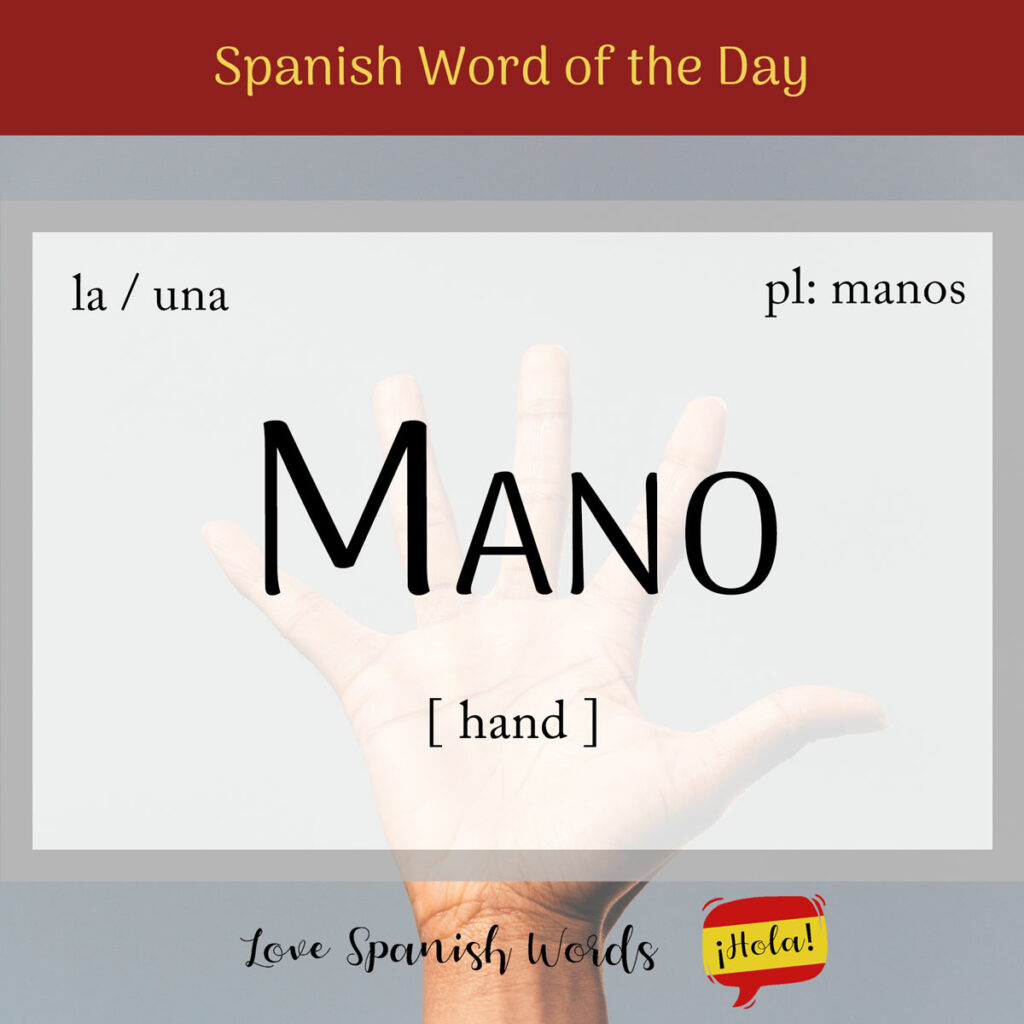Mano is the word for hand in Spanish. It has its origins in the Latin word manus, which also means hand.
Because of the important role the hand plays in our lives, it’s used in numerous Spanish expressions. Learning these common phrases will help you understand and communicate more fluently.
Latin American Pronunciation
European Pronunciation

Most of the time in Spanish, nouns that end in o are masculine and words that end in a are feminine. In the case of mano, it breaks this ‘rule’ – despite ending with an o, it’s a feminine noun. Mano takes the following definite and indefinite articles:
- la mano = the hand
- las manos = the hand
- una mano = a hand
- unas manos = some hands
Each mano has five dedos (fingers). They are as follows: pulgar (thumb), índice (index), corazón or mayor (middle), anular (ring), and meñique (pinky). The literal translation for the middle finger is heart (corazón) and the oldest (mayor).
Despite their official name, sometimes the fingers will be referred to differently. The thumb is referred to as el dedo gordo (fat finger), the index finger is dedo de apuntar (pointing finger), the ring finger is called dedo del anillo (the ring finger), the middle finger is sometimes called el dedo de en medio (middle finger) and the pinky goes by the name of pinky or dedo chiquito (small finger).
The other parts of the hand include uñas (nails), palma (palm), muñeca (wrist), puntas de los dedos (fingertips), and nudillos (knuckles).
El niño se quebró la mano jugando baloncesto.
The boy broke his hand playing basketball.
Me quemé la mano mientras cocinaba.
I burned my hand while cooking.

There are many Spanish words and short phrases that use the word mano to describe an object or activity. Some of the most common are the following:
- a mano libre = freehand
- hecho a mano = made by hand
- de primera mano = first-hand item
- de segunda mano = second-hand item
- lavar a mano = hand wash
- saludo de mano = handshake
- freno de mano = handbrake
- mano de obra = workforce
- equipaje de mano = hand luggage
Ayer fui a la tienda y compré un pantalón de segunda mano.
Yesterday I went to the store and bought a pair of second-hand pants.
This list above is short in comparison to the number of expressions that use the word mano in Spanish. Some of these expressions reference someone’s ability to do something while others relate to helping. Some phrases mention putting your hands into something physical and others are negative hand actions. Here is a list divided into sections.
Expressions for demonstrating ability
- tener buena mano = to be good at something (like cooking, with kids, taking care of plants)
- tener la mano larga = to be able to hit someone with ease
- ser mano de santo = to be good at helping someone feel better (usually in health with home remedies and sometimes associated with cleaning)
- tener mano izquierda = to have a left hand refers to being good at managing complicated or diplomatic situations
- ser un manitas = to have the ability to make anything with your hands/ someone agile
- ser un manazas = to be clumsy (opposite of manitas)
- tener buena mano en un juego de cartas = to have a good hand or good game in a game of cards
Mi padre tiene buena mano para las plantas.
My father is good at looking after plants.
Expressions for showing or asking for help
- agarrar de la mano = to get the hang of it / to hold on to someone’s hand for guidance
- dar la mano = to give a helping hand
- tender la mano = to lend a hand
- echar una mano = to help someone
- pedir la mano = to ask for help / to ask for a hand in marriage
- estar a mano = something is nearby / to not owe someone something because you both paid a debt to each other
- ser la mano derecha = to be someone’s right hand or person of trust (at work or in life)
- poner manos a la obra = to get started on a project or to get started on helping someone on something (to put hands to work)
Mi amiga me pidió la mano para mudarse de apartamento.
My friend asked for help with moving apartments.
Expressions for putting your hand in something
- meter la mano = to intervene in something / to steal something
- meter mano/manosear = sexual connotation of touching up or feeling up someone
- con las manos en la masa = to find or catch someone doing something wrong such as stealing / to catch red-handed (literal translation “with hands in the dough”)
- llevar algo por la mano = to lead something such as a project
- poner las manos al fuego = literally “to put hands in fire,” it means that you are sure someone didn’t do something and will defend their actions or an accusation against them.
- meter las manos al bolsillo = to put hands in pockets, it means to have nothing to do but twiddle your thumbs
La policía encontró al ladrón con las manos en la masa.
The police caught the thief red-handed.
Expressions describing other actions
- tomarse la justicia por su mano = to take justice in your hand (to seek vengeance without authorities’ help)
- ponerse en las manos de alguien = to put yourself in someone’s hand (to trust them to guide or help you get a job done)
- tratar con mano dura = to treat someone or demonstrate authoritative power (tough love)
- levantar la mano a alguien= to hit someone (“raise the hand at someone”)
- lavarse las manos= to remove yourself from responsibility or involvement in something to avoid problems
- decir algo con el corazón en la mano / decir algo con la mano en el corazón= to say something deep or in a sincere form
- dar una segunda mano = to give a second coating (example: of paint)
- forzar de la mano = to force someone’s hand to do something
El niño malcriado le levantó la mano a su mamá
The spoiled child raised his hand to his mother.
Expressions with a negative event or result:
- fuera de las manos = out of reach / to get out of control
- irse de las manos = to get out of control
- pasarse de la mano = to overdo it
- perder la mano = to lose the ability to do something well / to exceed or cross a limit
- a mano armada = to steal with a weapon in hand
Additional Expressions
- a la mano / tener a mano / cerca a mano = within reach
- estar en buenas manos = to be in good hands (to be around good and trusting people)
- mano a mano = to be side by side / head to head / a one-on-one / two-way contest
El ladrón robó el banco a mano armada.
The thief robbed the bank at gunpoint.
Idiomatic expressions featuring ‘mano’
Estar con una mano delante y otra detrás
Literal translation: to have one hand in front of you and one behind
English meaning: to not have money

